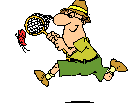|
Ecology is the science of the
environment
A
biologist studies living organisms

An ecologist is a biologist who studies how the
living organisms and their non-living environments
all relate to each other.
Some
examples of living and non-living
things that make up our environments are:
|
LIVING |
NON-LIVING |
|
Plants
Animals
(including humans)
Fungi
Microorganisms
|
Oceans
Soil
Glaciers
Atmosphere
Volcanos |
An ecologist is a
scientist.
A scientist is a scientific investigator.
An ecologist
looks for the reasons
that cause plants, animals and the environment to be unhealthy.
Then scientists conduct research to find out how to correct what is wrong.
Would you like to be a scientist?
We hope so! Our
Planet needs you.
Ology
You might be an OLOGIST! Click into this American Museum of
Natural History site and find out if you are. |
Kids
Do Ecology
Learn more about ecology and how you can become an
ecologist. You'll find lots of interesting information in
the Questions and Answers on the Frequently Asked Questions (FAQ)
page. In the Experiments section you can learn all about the
scientific method with an activity. (National Center for Ecological
Analysis and Synthesis)
The
NCEAS
is a research center to advance the state of ecological
knowledge. Educational opportunities are available for
graduate students and young scientists. |
Ecology Project
Kids, it's important to
investigate things closely, but
it is also necessary to see
the larger picture of connecting webs of
life.
Click
here and we'll show you what we mean. |
Ecology Club
Ideas
We have some suggestions for starting an Ecology Club in
your school. If you already have an ecology club, you may
find some information and resources that
will be of interest to your members. |
|